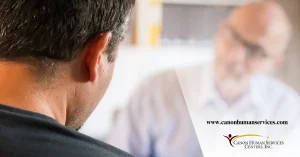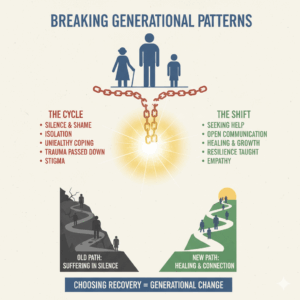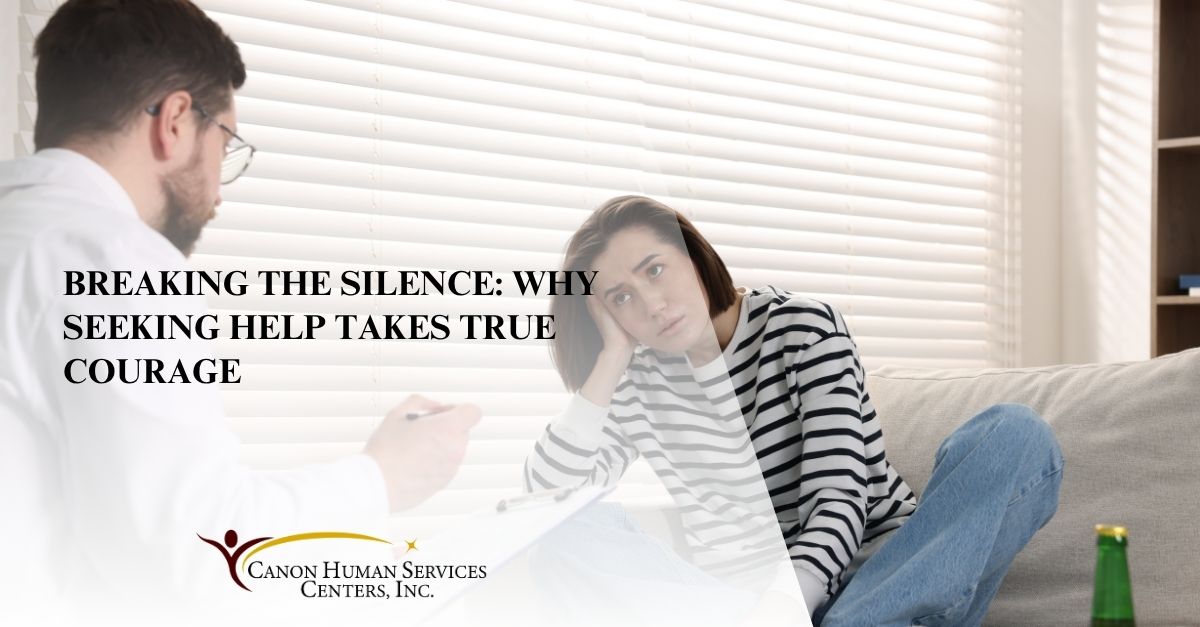The phone sits heavy in your hand. You’ve dialed the number to an addiction treatment center three times today, hanging up before anyone answers. Your heart pounds as you wrestle with thoughts that echo what you’ve heard your whole life: “Strong people don’t need help.” “Real men handle their problems alone.” “Asking for support means you’re weak.”
These beliefs aren’t just harmful—they’re deadly. According to the National Survey on Drug Use and Health, only 10.3% of people with substance use disorders receive treatment in any given year. The remaining 89.7% continue to struggle in silence, often due to the crushing weight of stigma that surrounds addiction and mental health challenges.
This silence doesn’t just affect individuals; it ripples through families, communities, and entire generations. Breaking free from this cycle requires us to confront uncomfortable truths about how our society views vulnerability, strength, and the courage it takes to seek help.

The high cost of silence surrounding addiction treatment centers
Stigma operates like an invisible prison, built from generations of misunderstanding and fear. When someone struggling with addiction internalizes messages that seeking help equals weakness, they often choose isolation over recovery. This choice rarely leads anywhere positive.
Stigma operates like an invisible prison, built from generations of misunderstanding and fear. When someone struggling with addiction internalizes messages that seeking help equals weakness, they often choose isolation over recovery. This choice rarely leads anywhere positive. Many individuals who could benefit from the specialized care and counseling available through an addiction treatment center delay seeking help due to these deeply ingrained beliefs.
Research from the American Journal of Public Health reveals that stigma significantly delays treatment entry and reduces the likelihood of completing programs. People avoid seeking help because they fear judgment from employers, family members, and their communities. They worry about being labeled as “addicts” or “crazy” rather than being seen as human beings facing genuine health challenges.
The numbers paint a stark picture. The Substance Abuse and Mental Health Services Administration found that among adults who needed but didn’t receive treatment for substance use, 95.5% didn’t think they needed help. While this statistic reflects various factors, stigma plays a major role in preventing people from recognizing when professional support could change their lives.
Court-ordered rehabilitation adds another layer of complexity to this issue. Many people enter treatment reluctantly, viewing it as punishment rather than opportunity. This perspective, often reinforced by societal attitudes, can make the healing process more challenging. However, research consistently shows that people who enter treatment through the justice system can achieve recovery outcomes similar to those who seek help voluntarily—when they receive compassionate, evidence-based care.
Redefining strength and courage through the support of an addiction treatment center
True strength isn’t found in suffering alone. It emerges when someone recognizes they’re facing a challenge bigger than themselves and takes action to address it. This kind of courage requires enormous self-awareness, humility, and determination.
Consider this: When someone breaks their leg, no one expects them to “tough it out” without medical attention. We understand that bones need proper treatment to heal correctly. Addiction and mental health challenges work similarly—they’re medical conditions that respond to appropriate treatment and support.
The most courageous people are often those who acknowledge their vulnerabilities and actively work to address them. They understand that asking for help isn’t about admitting defeat; it’s about choosing a different path forward. This shift in perspective can transform how we view both ourselves and others who are struggling.
Many people discover that entering treatment, whether voluntarily or through court mandate, becomes a turning point rather than a setback. The structured environment, professional guidance, and peer support available at quality addiction treatment centers create space for healing that simply doesn’t exist in isolation.
The Power of Community in an Addiction Treatment Center
Humans are inherently social beings. We heal in relationship with others, not despite them. Professional treatment programs understand this fundamental truth and structure their services accordingly.
Outpatient programs allow people to receive intensive support while maintaining connections to their daily lives. This approach works particularly well for individuals who have strong family support systems or employment they need to maintain. The flexibility of outpatient care makes it possible for both men and women to access help without completely disrupting their responsibilities.
Residential treatment offers a different kind of intensive support. For men facing severe addiction challenges, residential programs provide 24-hour care in a controlled environment where recovery can become the primary focus. This level of support isn’t available through willpower alone—it requires professional intervention and structured programming.
Both approaches recognize that recovery isn’t a solo journey. Group therapy sessions, family involvement, and ongoing counseling create networks of support that extend far beyond individual determination. These connections often become lifelines during difficult moments and celebrations during victories.
Challenging Cultural Narratives
Many communities, particularly those that have faced systemic challenges, develop cultural narratives around self-reliance that can inadvertently discourage help-seeking behavior. While self-reliance serves as a survival mechanism in many contexts, it becomes problematic when it prevents people from accessing life-saving resources.
In South Central Los Angeles and similar communities, residents often face multiple stressors including economic hardship, violence, and limited access to quality healthcare. These conditions can contribute to higher rates of substance use and mental health challenges. Simultaneously, cultural messages about “handling your business” or “keeping family matters private” can create barriers to seeking professional help.
Addressing these cultural barriers requires nuanced approaches that honor community strengths while expanding definitions of resilience. Effective addiction treatment centers understand these dynamics and work within cultural contexts rather than against them. They recognize that true cultural competence means helping people access support while respecting their values and identity.
The Role of Evidence-Based Treatment
Professional treatment isn’t just about good intentions—it’s about proven methods that create lasting change. Evidence-based approaches like cognitive-behavioral therapy, motivational interviewing, and family therapy have demonstrated effectiveness across diverse populations and various addiction types.
Drug-free treatment approaches recognize that medication isn’t always necessary or desired for recovery. These methods focus on developing coping skills, addressing underlying trauma, building healthy relationships, and creating sustainable lifestyle changes. The emphasis on drug-free treatment resonates with many people who want to avoid replacing one substance with another.
Professional counselors bring expertise that well-meaning friends and family members, despite their love and support, simply don’t possess. They understand the complex interplay between addiction, mental health, trauma, and social factors. This specialized knowledge enables them to guide people through recovery processes more effectively than general support alone.
Breaking Generational Patterns
One of the most powerful motivations for seeking help involves breaking cycles that have affected families for generations. Many people enter treatment not just for themselves, but for their children, grandchildren, and communities. This expanded perspective transforms help-seeking from a personal weakness into an act of generational healing.
When someone seeks professional treatment, they model healthy problem-solving for everyone around them. Children learn that adults can face difficulties without shame and that seeking help represents wisdom rather than failure. Spouses and partners see that recovery is possible with appropriate support. Communities witness that change is achievable through professional intervention.
These ripple effects extend far beyond individual recovery. They contribute to community healing and cultural shift that benefits everyone. When stigma decreases in one family, it often decreases in extended networks as well.

Taking the First Step Forward
Recovery begins with recognition—acknowledging that current strategies aren’t working and that professional support could make a difference. This recognition requires extraordinary courage, particularly for people who have been taught that self-sufficiency equals strength.
The first call to an addiction treatment center represents one of the most difficult and important decisions someone can make. It signals readiness to explore new possibilities and willingness to accept help from trained professionals who understand recovery processes.
For people facing court-ordered treatment, the challenge involves shifting perspective from compliance to opportunity. While the initial motivation might be external, the healing process becomes deeply personal. Many people discover that court-mandated treatment becomes the catalyst for changes they had wanted to make but couldn’t accomplish alone.
Both outpatient and residential treatment options provide structured pathways toward recovery. The choice between them depends on individual circumstances, severity of addiction, support systems, and personal preferences. What matters most is taking that first step toward professional help.
Moving Forward with Hope and Determination
Seeking help for addiction or mental health challenges isn’t about admitting weakness—it’s about exercising the kind of courage that transforms lives. It requires facing uncomfortable truths, challenging cultural messages, and trusting in the possibility of change.
Professional treatment centers exist because recovery is possible. They staff trained counselors, develop evidence-based programs, and create supportive communities because they have witnessed thousands of people reclaim their lives through treatment and ongoing support.
The stigma surrounding addiction treatment continues to evolve as more people share their recovery stories and advocate for compassionate approaches to mental health and substance use challenges. Each person who seeks help contributes to this cultural shift, making it easier for others to follow similar paths.
If you or someone you care about is struggling with addiction, remember that help is available. Professional counselors understand the complexities of addiction and recovery. They provide support without judgment and guidance based on proven methods. Most importantly, they believe in the possibility of healing and transformation.
The phone call that feels impossible today could become the first step toward the life you’ve been hoping to create. That conversation with a treatment professional could open doors you didn’t even know existed. The courage to seek help, whether voluntarily or through court mandate, represents strength in its purest form.
Recovery is possible. Support is available. The first step is reaching out.

